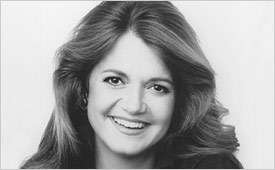|
Back
The Pacifist Battle of Britten New York
Avery Fisher Hall, Lincoln Centre
06/11/2009 - & June 12, 13, 2009
Benjamin Britten: War Requiem
Nancy Gustafson (Soprano), Vale Rideout (Tenor), Ian Greenlaw (Baritone)
New York Choral Artists, Joseph Flummerfelt (Director), The Dessoff Symphonic Choir, James Bagwell (Director), Brooklyn Youth Chorus, Dianne Berkun (Director), Lorin Maazel, Lionel Bringuier (Conductors)

Nancy Gustafson (© Christian Steiner)
It’s possible that I’ve never been as impressed with Benjamin Britten’s War Requiem as Orthodox Musical Codex prescribes, since I don’t believe that pacifism should be limited to the dogma of one religion. With all the respect I have for the composer and the poet who died all too young in World War I, both of them use the symbols and motifs of Christianity to affirm their beliefs.
True enough, Wilfred Owen paints a cynical picture of religion (Abraham actually does murder his child in this version), and Mr. Britten paints a sometimes raucous version of a Mass for the Dead. But the sum of the words to the War Requiem are that the dead will dwell with the Choir of Angels, and, rather than condemning war, the Poet can only “warn” about the “pity of war.”
Music, though, should be judged on its own merits, not one’s personal beliefs. Putting aside personal ideologies, this can be very stirring music. So perhaps another reason I was not moved as much as I should have been is that this is definitely cathedral music. And no matter how they tried to space it out—with sometimes offstage boys’ choir, with soloists standing on either end of the proscenium—the spatial grandeur was simply missing last night.
I never heard the work in the place for which is was associated, Coventry Cathedral, but visiting that wondrous edifice, it was obvious that Britten was taking into essential consideration the length, the breadth, the resonances, and the massive almost Medieval area of Coventry.
The stage of Avery Fisher Hall was scrunched up to the limits. I wanted to see the Brooklyn Youth Choir—which was absolutely magnificent. I wanted to see the chamber orchestra (a hearkening back to 14th Century Mystery Plays?) rather than watching the baton of conductor Lionel Bringuier pop up from the stage assemblage.
Above all, I wanted different parts of the stage, or the whole concert hall, buzz and ring with Britten’s theatrical orchestral playing. Yes, it might have been commonplace to put parts of the brass choir in the Libera Me up in a balcony à la Berlioz, but those things work. The boys choir could have been high up, as the angels they are supposed to be, but again, they were clumped up with the chorus.
Still, granted those limitations, Lorin Maazel knew what he was doing—as usual. The New York Philharmonic sounded as brilliant, as it has in years. That “Saint Michael” section of the Offertorium—obviously imitated by Bernstein in his own Mass—was particularly jazzy, the somber lower strings were almost heart-rending in the opening, and the other moods were dramatic and sometimes eloquent.
They couldn’t have been beautiful in one of Britten’s most inspiring moments, the climax of the War Requiem, that tender dialogue between Libera Me and In Paradisum, mourning the death of both English and German soldier.
And here we come to the Dessoff Symphonic Choir, and New York Choral Artists (who, I gather, were amalgamated). They were exact, they were flexible, and usually the words were so clear that the screen was hardly necessary.
Britten’s original soloists were chosen symbolically—a German, a Brit and a Russian—but he got the best, as the original recording well shows. Mr. Maazel picked three Americans, but they were also excellent.
Nancy Gustafson, above all, had the soaring vibrant quality which the composer aimed for. Both the baritone and tenor—Vale Rideout and Ian Greenlaw—were effective, though one was still concerted to hear them at the extreme end of the stage. (Ms Gustafson sung from “my” section of the stage!).
Yet reservations should disappear, since Mr. Maazel had the tempos right, he brought forth the tenderness and the turmoil with unerring ease, and his entire ensemble was worthy of the music. If one dreamed for the Venetian Renaissance grandeur of St. Mark’s or the endless apses of Coventry….well, we could only dream on. To paraphrase a man who would have had closed his ears to the War Requiem, Donald Rumsfeld, “You play the music with the forces that you got.”
Amen.
Harry Rolnick
|